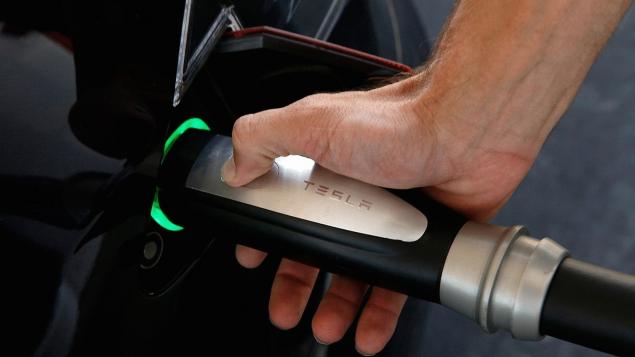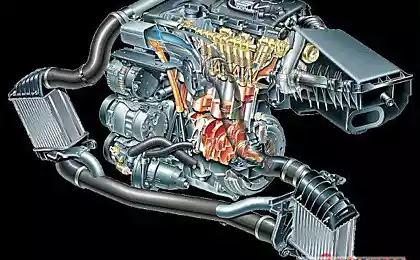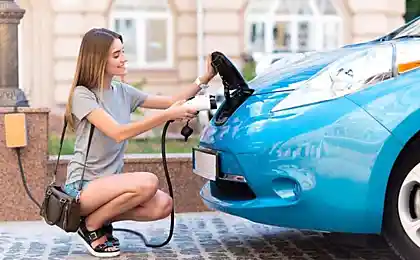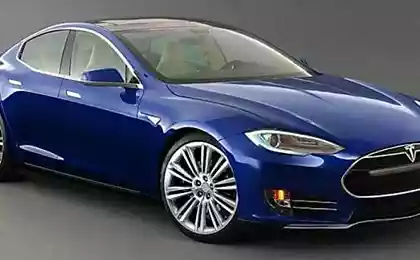450
"Environmental cleanliness" of electric cars depends on the energy source
Electric cars will not save the planet — to such conclusion scientists of the University of North Carolina. A study published in the journal Environmental Science & Technology.In their work, the researchers analyzed 108 different scenarios for the development of transport and energy systems of the United States to 2050. Consideration was given to such variables as the price of oil and gas, possible changes in regulations of greenhouse gas emissions, fluctuations in the value of batteries, and as a result, the economic attractiveness of electric vehicles of different types.
Experts at the University of North Carolina found that in the most optimistic scenario by 2050 only 40% of the cars in the United States will have hybrid or fully electric engines. The level of carbon dioxide in the atmosphere will not change compared to the model in which electric vehicles are generally not used. This result has a simple explanation: on the one hand, passenger vehicles generate no more than 20% of the total incoming carbon dioxide into the atmosphere. On the other hand, electric vehicles will increase the load on the power plant and, consequently, the volume of their emissions.

However, according to lead author of the study Joseph Decarolis, this is not a reason to abandon EVS, because they, at least, reduce the state dependence on hydrocarbons and make cleaner air in the cities. The influence of "environmentally friendly" transportation on the environment is determined not so much by its own emissions, as the production technology of "fuel" on which it travels — in this case, electricity. With fuel connected, and key consumer disadvantage of electric vehicles is a small driving range on a single battery charge and a variety of difficulties with the recovery of this charge: availability of outlet or special charging station, the duration of the process of "refueling", and so on.
In 2012, the breakthrough was the advent of the electric car Tesla Model S can travel up to 426 kilometers on a single battery charge (in the maximum configuration). To date, the "Model S" is the most "long-range" among mass-produced electric vehicles, which partly solves the infrastructure problem. In addition, the manufacturer has created its own network of Express filling stations in the United States (full "tank" per hour), and in 2014 began the development of a network in Europe. However, the ecological dilemma of electric cars remains unresolved — at least in the United States, where hydrocarbons account for two-thirds of all generated electricity. The entire potential of the electric vehicle disclosed in the countries in the energy sector dominated by renewable energy sources. This is best illustrated by the example of Norway, receiving almost all of its electricity from hydroelectric power.
In August 2013, sales of the Tesla Model S began in Europe. In September in Norway, the car surpassed the sales of all the competitors, including traditional internal combustion engines. The reason is the tax policy of the state.
Tax deduction when buying a Tesla Model S in Norway is greater than the base value of the car. Without it, the cost of the machine would have doubled due to taxes and fees, as is the case with conventional "gasoline" cars. As a result, in Norway Tesla, for example, is cheaper than traditional cars of the same class. In addition, drivers of electric vehicles are allowed movement on the allocated strip for public transport.
At the end of 2013, the most popular electric car in Norway was the Nissan Leaf — 60% of sales among cars with zero exhaust. The share of the Tesla Model S accounted for only 25%. The government expects to increase the number of electric vehicles on the roads of the country to 50 thousand by 2018. Now they are 7 885, or 5.6% of all cars by that measure, Norway ranks first in the world. So far the only country that can make it in this competition – the Netherlands, which last year tripled its environmentally friendly fleet, bringing its share to 5.37%. In total there are 380 thousand electric cars and hybrids.
published
Source: newsland.com
Experts at the University of North Carolina found that in the most optimistic scenario by 2050 only 40% of the cars in the United States will have hybrid or fully electric engines. The level of carbon dioxide in the atmosphere will not change compared to the model in which electric vehicles are generally not used. This result has a simple explanation: on the one hand, passenger vehicles generate no more than 20% of the total incoming carbon dioxide into the atmosphere. On the other hand, electric vehicles will increase the load on the power plant and, consequently, the volume of their emissions.

However, according to lead author of the study Joseph Decarolis, this is not a reason to abandon EVS, because they, at least, reduce the state dependence on hydrocarbons and make cleaner air in the cities. The influence of "environmentally friendly" transportation on the environment is determined not so much by its own emissions, as the production technology of "fuel" on which it travels — in this case, electricity. With fuel connected, and key consumer disadvantage of electric vehicles is a small driving range on a single battery charge and a variety of difficulties with the recovery of this charge: availability of outlet or special charging station, the duration of the process of "refueling", and so on.
In 2012, the breakthrough was the advent of the electric car Tesla Model S can travel up to 426 kilometers on a single battery charge (in the maximum configuration). To date, the "Model S" is the most "long-range" among mass-produced electric vehicles, which partly solves the infrastructure problem. In addition, the manufacturer has created its own network of Express filling stations in the United States (full "tank" per hour), and in 2014 began the development of a network in Europe. However, the ecological dilemma of electric cars remains unresolved — at least in the United States, where hydrocarbons account for two-thirds of all generated electricity. The entire potential of the electric vehicle disclosed in the countries in the energy sector dominated by renewable energy sources. This is best illustrated by the example of Norway, receiving almost all of its electricity from hydroelectric power.
In August 2013, sales of the Tesla Model S began in Europe. In September in Norway, the car surpassed the sales of all the competitors, including traditional internal combustion engines. The reason is the tax policy of the state.
Tax deduction when buying a Tesla Model S in Norway is greater than the base value of the car. Without it, the cost of the machine would have doubled due to taxes and fees, as is the case with conventional "gasoline" cars. As a result, in Norway Tesla, for example, is cheaper than traditional cars of the same class. In addition, drivers of electric vehicles are allowed movement on the allocated strip for public transport.
At the end of 2013, the most popular electric car in Norway was the Nissan Leaf — 60% of sales among cars with zero exhaust. The share of the Tesla Model S accounted for only 25%. The government expects to increase the number of electric vehicles on the roads of the country to 50 thousand by 2018. Now they are 7 885, or 5.6% of all cars by that measure, Norway ranks first in the world. So far the only country that can make it in this competition – the Netherlands, which last year tripled its environmentally friendly fleet, bringing its share to 5.37%. In total there are 380 thousand electric cars and hybrids.
published
Source: newsland.com
Ingredients chocolate prevent obesity and diabetes
The Americans managed to create a rocket biofuels























